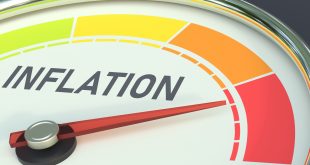Although several Wall Street banks and traders expected the Fed to chart a very aggressive course in normalizing policy due to surging inflation, that outlook has shifted amid the heightened tensions in Europe.
Some observers suggest that Fed could adopt a less hawkish stance on the backdrop of the prevalent escalation in the context of the Ukraine-Russia conflict.
This viewpoint is based upon the assumption that raising rate amid Russia-Ukraine conflict may result in recession. The rapidly escalating tensions between Ukraine and Russia have cast fresh uncertainty on the Federal Reserve’s monetary policy future. The US central bank policymakers could be forced to take a more dovish approach as they begin raising interest rates for the first time in three years.
The simmering crisis in Eastern Europe has added to Fed’s worries, including the hottest inflation in four decades. The conflict could eventually lead central bank policymakers to consider a less hawkish pivot as they prepare for interest rate liftoff.
Overly restrictive monetary policy could result in an outright policy error especially if the business cycle continues to deteriorate. At the same time, the Russia-Ukraine crisis could lead to inevitable reassessment of the upcoming quantitative tightening path resulting in central banks turning less hawkish, while policymakers may consider additional fiscal stimulus.
Although traders still expect the Fed to raise the federal funds rate at its meeting next month, the appetite for a mega, half-point hike has fallen to 32% from over 94% just last week.
Russia has amassed about 150,000 troops on three sides of Ukraine, and President Biden has repeatedly warned that Russian counterpart Vladimir Putin plans to invade the country. Moscow has repeatedly denied that it is planning to attack Ukraine.
Biden on Tuesday afternoon announced a raft of heavy financial sanctions against Russian banks and oligarchs, accusing Moscow of flagrantly violating international law in what he called the “beginning of a Russian invasion of Ukraine.” He pledged to impose more sanctions if Putin continues to escalate the conflict.
Biden joined the EU leaders in levying harsh sanctions against Moscow: The 27-member bloc of nations also voted to target Russia over its actions in Ukraine, including Germany announcing that it would halt the certification of the Nord Stream 2 gas pipeline.
Russia is the world’s second-largest producer of both oil and natural gas; a conflict or sanctions could disrupt the oil market even further at a time when high demand is outpacing tight supplies. OPEC+, have resisted calls to boost supply. Goldman Sachs estimated on Tuesday that oil prices could rise 13.6% in the case of an “outright conflict” between the two nations.
It’s unclear how the Federal Reserve will respond to the geopolitical uncertainty which could create higher inflation in the short term.
The Federal Reserve pays very close attention to geopolitical events, and this crisis of course in particular as it is the most prominent at this point,” Michelle Bowman, a Fed governor and a voting member on the policy-setting FOMC, said on Monday. While she noted the U.S. has minor banking, financial and trade interests with Russia, which would not have a “significant impact” on the U.S. economy if a war broke out, she acknowledged there are “potential impacts” on the energy markets.
“Obviously we’ll continue to watch that, and if we believe that might have some influence on the global economy, we’ll take that into account as we’re going into our meetings and discussing the economy more broadly,” she said.
Overly restrictive monetary policy could result in an outright policy error especially if the business cycle continues to deteriorate.
Some investors and traders believe that the softer the landing, the worse the problem will get. In other words, Fed cannot leave the money creation faucet open until inflation destroys the economy and most everyone’s savings and retirement funds.

 Noor Trends News, Technical Analysis, Educational Tools and Recommendations
Noor Trends News, Technical Analysis, Educational Tools and Recommendations



